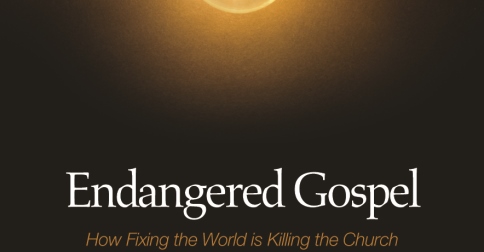 John and I agree that the practice of reading is essential to our understanding of Slow Church. Indeed, it was a mutual love of books that connected us in the first place. In the age of talking heads, the soundbite and the two-minute YouTube video, reading is a practice that can be useful for slowing churches down and guiding us into meaningful conversations. Here at Englewood Christian Church, we are blessed to have many people who are deeply committed to the practice of reading, which continually energizes our on-going Sunday night conversation (I have told the story of this almost-fifteen-year-old conversation and its formation of our life together in my recent ebook The Virtue of Dialogue) and which inspired us to launch The Englewood Review of Books.
John and I agree that the practice of reading is essential to our understanding of Slow Church. Indeed, it was a mutual love of books that connected us in the first place. In the age of talking heads, the soundbite and the two-minute YouTube video, reading is a practice that can be useful for slowing churches down and guiding us into meaningful conversations. Here at Englewood Christian Church, we are blessed to have many people who are deeply committed to the practice of reading, which continually energizes our on-going Sunday night conversation (I have told the story of this almost-fifteen-year-old conversation and its formation of our life together in my recent ebook The Virtue of Dialogue) and which inspired us to launch The Englewood Review of Books.
However, how and why we read is just as important as the act of picking up a book (or ereader) and reading. A major facet of the Slow Church book is the nurturing of conversations in the church community (and beyond). In fact, the tentative title for the book’s conclusion, the image that we want to leave kicking around our readers’ brains, is “Dinner Table Conversation as a Way of Being Church.” Thus, the idea of reading for conversation has been on mind mind a good bit recently. Reading for conversation is the sort of attentive practice that I believe will be beneficial for churches in the struggle against the forces of Western culture to slow down. First, we must read to be in conversation with the author, carefully trying to understand where they are going with the work and trying to prepare ourselves to articulate their message faithfully. We must ask questions of the author which the book may or may not answer sufficiently before it ends. Secondly, we must read for conversation with others. There are perhaps times and settings when we must read for to absorb information for ourselves alone, but the most culturally beneficial sort of reading is that in which the book is discussed with others, and we reflect on its meaning for us together amidst the particularities of our own time and place.
There is also a broader conversation about reading that begins before we ever gently open the spine of a new book, the quest for what to read next. What book will speak wisdom into the particularities of our context? “Of making many books there is no end” bemoans the prophet in Ecclesiastes 12, and thus we enter into the conversation of discerning what to read. Curating this sort of conversation for Christians has been central to the mission of The Englewood Review of Books, but there is only so much that we can cover. For readers who want an even broader view of this conversation, we have compiled a new Facebook interest list (a new FB feature) of sources that we rely upon for book news, called “Book news for Culture-making Christians” (Yes, that is an intentional tip o’ the hat to Andy Crouch’s helpful book Culture Making). If you are on Facebook, and if you are wanting to keep better tabs on new books that are being discussed, I recommend subscribing to this list and sharing it with others.
May our reading draw us into deeper conversation with our brothers, sisters and others about the rich and abundant life that we share together within God’s creation and about the Creator who is the ever-flowing font of that life!












